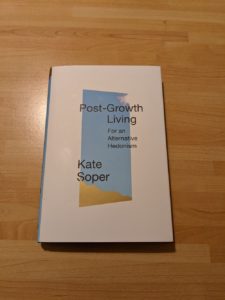Post-Growth Living by Kate Soper
Written by Ashley Kelmore, Posted in Reviews
Best for:
Philosophy students and lecturers
In a nutshell:
Soper’s project is exploring how people can rethink their idea of the good life to fit in with the reality of our current consumer culture’s negative impact on our own lives and the environment.
Worth quoting:
“However critical they may be of capitalism in other respects, socialists are still much too ready to subscribe to conventional views on the ‘good life’ and what constitutes a ‘high’ standard of living.”
Why I chose it:
A podcast I listen to described it in the liner notes. As someone who enjoys a good philosophy book, and someone who has some fairly conventional ideas of what the good life is (especially where travel is concerned), I was intrigued.
(I’m not huge on interviews, so I didn’t actually listen to the podcast interview with the author, which may have been a mistake.)
Review:
Did you ever see the movie “In Time”? I remember reading the premise for it and I was so excited. It’s a sci-fi thriller, and the main concept is that people are allocated a certain amount of time to live, and then they work to earn more. Time is currency, so you lose time off your life when you buy groceries or pay rent or whatever. It seemed like such an interesting concept, and one that could be done really well. But the movie itself was … not great. Lots of missed opportunities, unnecessary parts. Not horrible, and still making some interesting points, but overall a let down.
I kept thinking of that movie when I reading this book.
It took me about ten days to get through the first chapter. It is (at least, I hope) more of an academically-focused book, and while I’ve read a few in my time, this one was a challenge to get into. After that first chapter, the rest was definitely easier to read, but still unnecessarily complicated.
But what bothered me the most, and what I found to be a missed opportunity, is that I don’t think Soper ever actually defined her concept of Alternative Hedonism. What does it entail? What are the main components? What could fit into her definition? She spends the book talking about different areas of life that need a review – work, overall consumption, the idea of what prosperity is – with a lot of focus on the impact of all this living on the environment to the detriment of our futures. But there isn’t anywhere I could find that laid out how she defined what she was arguing for. I’d think that would belong in the Introduction, but if it was there, I didn’t see it. So it makes for a challenging read, trying to figure out what argument the author is trying to make.
There are definitely important and interesting points the author is aiming to make, I just don’t think they are successful if the audience is anyone who isn’t a Philosophy professor, or someone who is deeply steeped into this style of writing.
Keep it / Pass to a Friend / Donate it / Toss it:
Donate it

